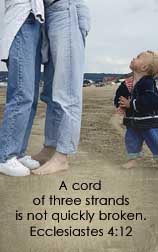Wednesday, October 7, 2009
What Does "Enough" Look Like?
11:08 PM |
Edit Post
In a conversation with some other homeschooling moms this week on As A Mom , I was reminded of another reason that so many homeschooling families quit after only a year or two, and why many more refuse to consider homeschooling in the first place.
If we revisit the conventional school model, we see that most children are in school from about 8am-3pm, with only a few short breaks in between. Their time in school is, depending upon their age, broken up into approximately 40-60 minutes per subject area, and they study most subjects every day. This gives some homeschooling parents the notion that they need to keep their children busy with school work for at least 6 hours a day, and spend at least some time in each subject every day. Since we can't see how we could possibly spend that much time on school, we assume that we are substandard teachers and not doing "enough".
I'd like to take a moment to bust this myth open with a sledgehammer.
In conventional schools, teachers are typically in charge of somewhere between 15-30 children, sometimes even more. This does not allow for much one-on-one time with each student. On the flip side, a homeschooling mom, even if she has a large family, has plenty of opportunity throughout the day for one-on-one interaction with each child. One home educating mother put it well when she said, "really, we are less like teachers and more like tutors".
With this kind of consistent interaction, our school day doesn't have to be confined into little windows of time set aside to cover today's chapter in each textbook. We can spend all morning on a science project if we'd like. On the next day, we can devote ourselves to reading a living book from an important time in history, and then spend the rest of the day engaging in meaningful conversation about what life might have been like for people who lived during that time.
Conversely, reading lessons with my Kindergartener typically take 15 minutes or less. He is completing them even faster as his proficiency as a reader increases. That doesn't necessarily mean that he only spends 15 minutes per day reading. Today, he read several books chosen by himself, without prompting. It does mean, though, that once our 15 minute reading lesson was completed, we could be done for the day.
It was enough.
What does "enough" look like?
Let us seek these greater gifts, and release the worry and guilt that we feel about not doing "enough" school.
If we revisit the conventional school model, we see that most children are in school from about 8am-3pm, with only a few short breaks in between. Their time in school is, depending upon their age, broken up into approximately 40-60 minutes per subject area, and they study most subjects every day. This gives some homeschooling parents the notion that they need to keep their children busy with school work for at least 6 hours a day, and spend at least some time in each subject every day. Since we can't see how we could possibly spend that much time on school, we assume that we are substandard teachers and not doing "enough".
I'd like to take a moment to bust this myth open with a sledgehammer.
In conventional schools, teachers are typically in charge of somewhere between 15-30 children, sometimes even more. This does not allow for much one-on-one time with each student. On the flip side, a homeschooling mom, even if she has a large family, has plenty of opportunity throughout the day for one-on-one interaction with each child. One home educating mother put it well when she said, "really, we are less like teachers and more like tutors".
With this kind of consistent interaction, our school day doesn't have to be confined into little windows of time set aside to cover today's chapter in each textbook. We can spend all morning on a science project if we'd like. On the next day, we can devote ourselves to reading a living book from an important time in history, and then spend the rest of the day engaging in meaningful conversation about what life might have been like for people who lived during that time.
Conversely, reading lessons with my Kindergartener typically take 15 minutes or less. He is completing them even faster as his proficiency as a reader increases. That doesn't necessarily mean that he only spends 15 minutes per day reading. Today, he read several books chosen by himself, without prompting. It does mean, though, that once our 15 minute reading lesson was completed, we could be done for the day.
It was enough.
What does "enough" look like?
- When the child completes the lesson. --When the assigned math problems for today are solved, when the copy-work has been written, when the chapter has been read, when the Bible verse has been memorized, it is enough. Even if it took you fifteen minutes. Even if it took you two minutes. You can move on. It's enough!
- When the material has been mastered.--Some educators advocate ceaseless repetition of exercises, regardless of whether or not the child has learned what he or she was to learn. This is particularly true of conventional classrooms, where students all work at the same pace regardless of ability. No wonder our nation's schools are so filled with bored underachievers! If your child has mastered the skill in one page, why do three? Come back and review it tomorrow, to be sure, but be done for the day. It's enough!
- When you or your child become frustrated.--Parents can exhaust themselves and their children by continuing to pound on a particular lesson when they are clearly not making any progress. It is okay to fly the white flag of surrender and revisit the topic at another time. Take some time to do something fun together, or to pursue a goal that you know you will easily accomplish. As you put a couple of tally marks into your "win" column, you may find that you're able to think more clearly about what went wrong today, and how you can do better tomorrow. There's no need to, as grandpa would say, "beat a dead horse". It's enough!
- When life provides an unexpected opportunity.--There are times when God interrupts our routines and it is in our best interest to take notice and follow His lead. Yesterday, after a dark evening and morning of heavy rain, the sun came out and we were surprised by the new brightness shining through our living room window. Having spent a great portion of the morning studying Noah, the flood, and the promise of God to never again destroy the whole earth with water, it only made sense for us to take a few minutes to see if we could find a rainbow. We didn't, but I'm still glad we tried. Is it an unusually warm day outside? Did a fresh snow fall? Did a neighbor just have a baby? Does she need a meal brought to her? Go ahead and put the book down. It will be there when you get back. It's enough!
Do I need to cover at least something in each subject area every day? NO!
Colleges and Universities don't do this, so why should you? If we do Bible every day and reading most days, it is enough. Everything else can be done less often.
Don't I need to complete the whole book by the end of the year? NO!
Can you remember taking any classes where you covered every chapter of every textbook you were issued? Neither can I. Some books will take you longer than September to May to complete. Some books you will never complete. You will either find that the material has already been mastered, or that your child will need another approach to the subject. Those books that are worth finishing can either be worked on during the summer or revisited in the fall. It is enough.
We can all get enough books and enough school. Our world is full of information overload. King Solomon wrote in Ecclesiastes 12:12, "Of making many books there is no end, and much study wearies the body."
There are other things we are unlikely to get enough of--
enough time in the Scriptures,
enough time in prayer,
enough time with our families,
enough time holding our children close,
enough time holding our children close,
enough time being of service to others,
enough time enjoying God's creation.
Let us seek these greater gifts, and release the worry and guilt that we feel about not doing "enough" school.
That is enough for this blog post. I'm going to bed.
Subscribe to:
Post Comments (Atom)
Subscribe via email
About Me

- Tiana
- I'm a Stay-at-Home, Christian, "crunchy" mama. I have been blessed with the calling to be a godly wife and mother. I am passionate about bringing up my children in the discipline and instruction of the LORD, through home education and discipleship. Helpmeet to my best friend and soulmate, Christopher since 1/29/2000, and mama to four little blessings, including a tiny, precious, newborn baby girl.
Most Popular Posts
- "Being Equipped" and the Will of God
- "Doing School"
- A Little Bit of Spontaneity
- Am I Really Content?
- Coming Out of the Closet
- Desperate for Discipleship
- Don't Be Afraid, Have Faith
- How Doing Something "Good" Can Keep You From Obeying
- Is it Really All About Me?
- Over-Protected, Under-Sheltered
- Remembering Acacia's Birth
- Slow Homeschooling
- The Most Important Thing
- What Do You Mean, "Unsocialized?"
- What Does "Enough" Look Like?
Fixing Your Heart on Titus 2
My Wired Style
Our Curriculum 2010-2011
Bible--Child's Story Bible by Catherine Vos, Apologia Biblical World View Book 1, "Who is God and Can I Really Know Him?"
Catechism-- "Training Hearts, Teaching Minds" by Starr Meade
Phonics--Teach Your Child to Read in 100 Easy Lessons
Literature--Ambleside Online Year 0 Recommended Books
(Kindergarten), Year 1 Booklist (1st Grade)
Handwriting--Bible Copywork, made using Educational Fontware
Spelling-- All About Spelling Level 1 (1st grade)
Math--Math-U-See Primer (Kindergarten) , Math-U-See Alpha (1st grade)
Science--Apologia Exploring Creation With Astronomy
World History--Simply Charlotte Mason's Genesis Through Deuteronomy and Ancient Egypt
American History--The Light and The Glory For Children Series
Art--Interest-led projects and handicrafts
Geography and Missions-- "Hero Tales" by Dave and Neta Jackson, as well as various other missionary biographies, incorporating globe and map study
*We will be studying music and phy-ed., participating in a writing club and nature club, as well as attending various field trips, with our church's homeschool group.*
























5 comments:
I came to you through As a Mom and love what you wrote. It's so true. We also don't have to take roll or collect homework. Homeschooling gives my children freedom!
This is timely for me. I've been trying to strike a balance between doing a good job but not becoming exhausted (and exhausting the kids) by pushing too hard. Thanks.
My word of caution is, do not bring public school home. If we have gone so far as to remove them from the very environment we're saving them from, why are we then duplicating the problem at home?
As a Christian I never read anywhere were Jesus forced learning, he always said, "Come Follow Me" meaning we must be the example we want them to follow. Involve the children in activites of managing the home, reading together and pratical application of math principles (cooking, sewing, buying carpet, building a bookcase, etc) We Inspire them to LOVE LEARNING and no force is necessary (satan's plan is one of force) Just some thoughts.
I've observed many diverse families in their homeschooling journey and most find success by dropping the 'traditional' schooling model, and involve their children in the everyday work a day world around them -- they learn more because they're not wasting time fighting. Just some thoughts.
I completely agree with you, Ann. None of my children have ever been to public school, and we want the education they receive at home to be very different from what they would get in a conventional classroom.
In my experience, most of the "homeschool drop-outs" I know felt they needed to do "school at home" and it only ended in frustration. One of my goals with this blog is to encourage parents to dump this line of thinking and embrace "along the way" education and discipleship.
Thanks for the comment!
:)Tiana
I wish I had read something like this back when I had begun homeschooling. I've managed to get through 10+ years, but it was a rocky beginning for my older two. It's more about the journey and being with your kids than some far off destination like college. In my area, I've heard many parents of kindergartners use the phrase, "What about college?" It's usually a good indication that they won't be homeschooling for very long.
Peace and Laughter!
Post a Comment